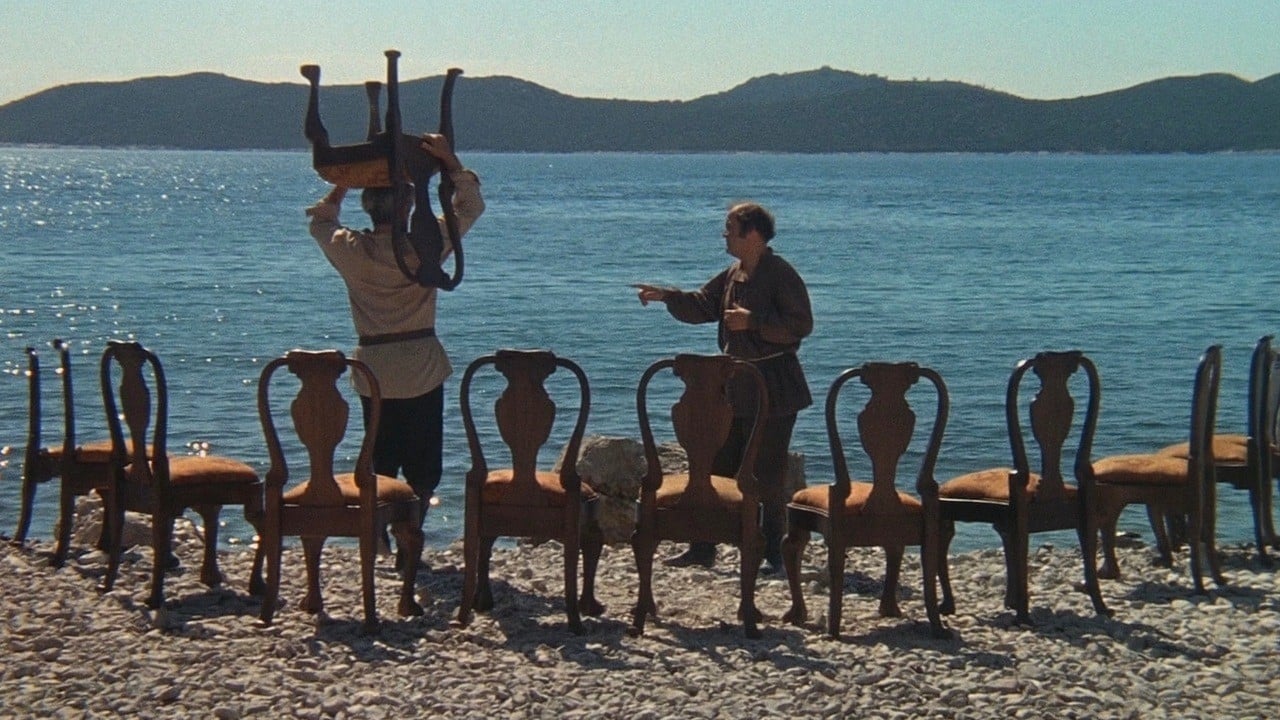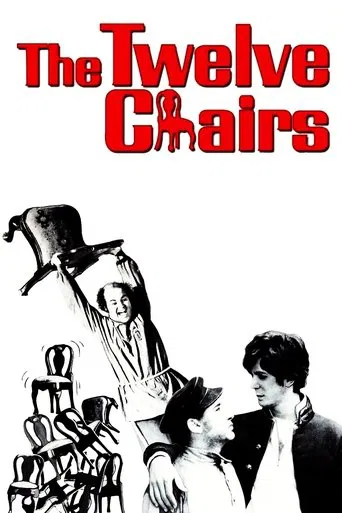

The second film that Mel Brooks directed after " The Producers" (1968)and this is loved by some and scorned by others. Put me in the line of scorners.There are laughs here, but there is a long gap between them,and film just seems to run out of ideas.Cast can't save it and just resort in the end to shouting and making other stupid noises. A poor comedy, at least better things were to follow.
... View MoreThe Twelve Chairs Years after the Russian Revolution in 1917, the former aristocrat Ippolit Matveevich Vorobyaninov (Ron Moody) is informed by his terminal mother-in- law that she has hidden her jewels in a the upholstery of chair from a set of twelve chairs. The Orthodox Father Fyodor (Dom DeLuise) also hears and leaves the Church to seek out the treasure. Vorobyaninov travels to his old house and meets his former servant Tikon (Mel Brooks) that adores him. He learns that the chairs had been expropriated by the new government and sent to another place. However the con artist Ostap Bender (Frank Langella) convinces Vorobyaninov to be his partner. They travel to Moscow where Ostap succeeds in luring Father Fyodor, telling that the chairs belong to the Engineer Bruns (David Lander), who has very similar chairs and lives with his wife in Siberia. Will Vorobyaninov and Ostap find the twelve chairs?"The Twelve Chairs" is a typical Mel Brooks' comedy with the usual type of humor with a satire to the Russian Revolution. This comedy is also the debut of Frank Langella in the cinema. Fans of Mel Brooks will certainly like it, but who is not his fan may not find this comedy entertaining. My vote is six.Title (Brazil): "Banzé na Rússia" ("Mess in Russia")
... View MoreI chose this movie because it was set in Russia and was pleasantly surprised, because I felt it presented a reasonably accurate portrait of the post-revolution Soviet Russia - obviously, that's just my opinion, but in this respect the movie delivered what I was hoping to see. I am not familiar with either Mel Brooks or with the original book so I did not know what to expect. The plot was pretty simple to follow, however, I didn't really feel it was enough to carry the whole movie. I think it was supposed to be funny, though I wouldn't call it a comedy. It had moments that elicited a chuckle or two, but that was about it. I would recommend it to get a glimpse of 1928 Russia which I thought was the strongest asset of the movie. If possible rent it rather than buy it, because I don't think this is a movie you would want to watch more than once.
... View MoreIt is the forgotten Brooks movie. Probably because it has the most controlled script story, and had the least wild, satyric inventiveness of any of his films. After he wrote and directed the original THE PRODUCERS, Brooks did not do another film for a few years. The second one was this one set in the post-Russian Revolution period in the Soviet Union. Ron Moody (Fagin in the musical OLIVER) is a minor Tsarist nobleman who discovers, when attending his mother-in-law on her death bed, that she hid her fortune in jewelry in one of the dining room chairs. There were a set of twelve chairs, and they were appropriated by the government to be given to deserving members of the proletariat. Moody discovers that his mother-in-law did confess this to one person besides him: the local Russian Orthodox Priest (Dom DeLuise). Moody finds the latter a difficult opponent to beat to the fortune first. By chance he falls in with a young swindler (Frank Langella) and he and Langella pursue the chairs, and also send DeLuise on a wild goose chase following a second set of similar chairs. What we get is a view of the Soviet Union in 1928, as the Civil Wars died out and the regime consolidated power. Trotsky's name is now dismissed (as a street shows). The stage is dominated by the state oriented drama that is anti-capitalist. Witness the performance of Andreas Voutsinas - the original "Carmen Ghia" in the first PRODUCERS, as the government backed manager of the theater group that Moody and Langella join. There is a life and death threat behind comments he gives to one of the stage crew he controls. We also see how the common people try to cope with the changes - being sent across country on government sponsored jobs - to houses that the government may furnish. Brooks has his first role in his own films in this one - as Tikhon, the drunken, ex-servant of Moody. He receives a slap from the latter, and considers it exactly like a hug. Like IT'S A MAD, MAD, MAD, MAD WORLD, THE TWELVE CHAIRS looks at the antics people will go through for hidden wealth. Langella, who is a street criminal anyway, is the only sane member of the three treasure seekers. He is a realist (the first really serious one in Brooks' films), and has adapted to the new conditions fairly easily by living on his considerably keen wits. He realizes that he is hampered as well as helped by his alliance with Moody, but manages to figure out how to live with Moody as best as possible. Moody has become a bureaucrat to survive in the new regime (he's suspect as an aristocrat), but he still has his pretenses. It takes the events he shares with Langella for him to finally give up his pretenses. Together both men find out what is really worthwhile about living. DeLuise is less lucky. He just discovers the perils of being a loner.
... View More